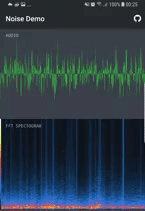Noise
A FFT computation library for Android
Noise is an Android wrapper for kissfft, a FFT implementation written in C. Noise features an api that is designed to be easy to use, and familiar for Android devs. However, a low level JNI api is available as well.
Sample app
Watch Noise compute FFT in real time from your microphone, the sample app is on Google Play!
Get started
Add jitpack.io repo to your root build.gradle:
allprojects {
repositories {
//...
maven {
url "https://jitpack.io"
}
}
}
Include in Android Studio < 3.0 projects
compile 'com.github.paramsen:noise:0.7.1' Or for Android Studio >= 3.0 with Gradle 4 projects
implementation 'com.github.paramsen:noise:0.7.1' Instructions
This lib is a Java api for kissfft, consult the kissfft readme if you want more information about the internal FFT implementation.
Instantiate Noise
Noise supports computing DFT from real and imaginary input data, through either a threadsafe or optimized implementation. An optimized instance computes DFT:s at half the time and should be fit for most use cases. Threadsafe instances can compute DFT:s concurrently for variable input sizes, but has an overhead of allocating memory for each invocation.
Real input
Instantiate an optimized instance, this example is configured to compute DFT:s on input arrays of size 4096 and internally manages the output array.
Noise noise = Noise.real()
.optimized()
.init(4096, true);
//input size == 4096, internal output array Invoke the FFT on some input data.
float[] realInput = new float[4096];
// .. fill realInput with data
// Compute the FFT with realInput:
float[] fft = noise.fft(realInput);
// The result array has the pairs of real+imaginary floats in a one dimensional array; even indeces // are real, odd indeces are imaginary. DC bin is located at index 0, 1, nyquist at index n-2, n-1
for(int i = 0; i < fft.length / 2; i++) {
float real = fft[i * 2];
float imaginary = fft[i * 2 + 1];
System.out.printf("index: %d, real: %.5f, imaginary: %.5f\n", i, real, imaginary);
}
Imaginary input
Instantiate an optimized instance, this example is configured to compute DFT:s on input arrays of size 8192 (4096 [real, imaginary] pairs) and internally manages the output array.
Noise noise = Noise.imaginary()
.optimized()
.init(8192, true);
//input size == 8192, internal output array In order to compute a DFT from imaginary input, we need to structure our real+imaginary pairs in a flat, one dimensional array. Thus the input array has pairs of real+imaginary like; float[0] = firstReal, float[1] = firstImaginary, float[2] = secondReal, float[3] = secondImaginary..
float[] imaginaryInput = new float[8192];
// fill imaginaryInput with data (pairs is an array of pairs with [real, imaginary] objects):
for(int i = 0; i < pairs.length; i++) {
imaginaryInput[i * 2] = pairs[i].real;
imaginaryInput[i * 2 + 1] = pairs[i].imaginary;
}
// Compute the FFT with imaginaryInput:
float[] fft = noise.fft(realInput);
// The output array has the pairs of real+imaginary floats in a one dimensional array; even indeces // are real, odd indeces are imaginary. DC bin is located at index 0, 1, nyquist at index n/2-2, n/2-1
for(int i = 0; i < fft.length / 2; i++) {
float real = fft[i * 2];
float imaginary = fft[i * 2 + 1];
System.out.printf("index: %d, real: %.5f, imaginary: %.5f\n", i, real, imaginary);
}
Output
Both the real and imaginary implementations produce an array of real and imaginary pairs, in a flat, one dimensional structure.
Thus each even and odd index is a pair of a real and imaginary numbers, we could convert the result array to an array of pairs to better show the relation like:
float[] fft = noise.fft(input);
Pair<Float, Float>[] pairs = new Pair<>[fft.length / 2];
for(int i = 0; i < fft.length / 2; i++) {
float real = fft[i * 2];
float imaginary = fft[i * 2 + 1];
pairs.add(new Pair(real, imaginary));
}
Sample code
I've written a sample app in Kotlin which computes FFT:s on the real time microphone signal. It features some cool Rx solutions for mic integration that might be interesting in themselves. It's on Google Play and the source can be found in the sample module.
Performance tests
The following tests measure the average FFT computation time over 1000 computations for an array of length 4096. Run on a new S8+ and an old LG G3 for comparison.
Samsung S8+:
Optimized Imaginary:
0.32ms Optimized Real:
0.32ms Threadsafe Imaginary: 0.38ms Threadsafe Real:
0.48ms LG G3:
Optimized Imaginary:
0.76ms Optimized Real:
0.72ms Threadsafe Imaginary: 1.02ms Threadsafe Real:
1.33ms Tests
The implementation has been tested for compliance with the kissfft C library; for the same input, equal output is given. The tests in the Android test suite that assures that equal output is computed by loading a pre defined data set and asserting the result against a precomputed result.
The precomputed result is generated by the C test suite that runs kissfft directly in C++.
Development
Setup
Kissfft is not bundled in the source of this repository for many reasons, I have resided to let a git module script initiate it with a manual step.
Setup steps are:
- Run
git submodule init; git submodule updatein project root - Check that kissfft exists in
noise/src/native/kissfft
Release
There's a Gradle task that uploads to Bintray and generates the README.md from template.
Release steps are:
- Bump version in
noise/build.gradle - Run
./gradlew releasein project root (generates readme) - Push generated readme changes to repo
License
Noise is licensed under the Apache 2.0.
Kissfft is licensed under the Revised BSD License.
